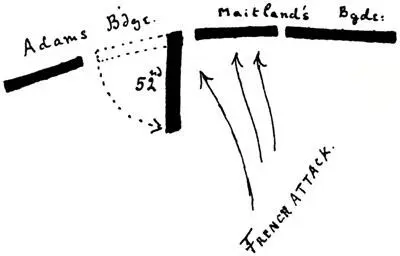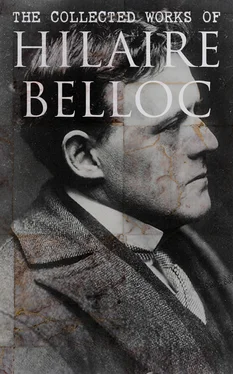As the Guard went upward, the whole French front to the right moved forward and supported the attack. But upon the left, the Second Army Corps, Reille’s recently broken 6000, could not yet move. They came far behind and to the west of the Brussels road; the Guard went up the slope alone.
At two hundred yards from the English line the grape began to mow through them. They closed up after each discharge. Their advance continued unchecked.
Of the four columns, 26that nearest to the Brussels road reached, touched, and broke the line of the defenders. Its strength was one battalion, yet it took the two English batteries, and, in charging Halkett’s brigade, threw the 30th and the 73rd into confusion. It might have been imagined for one moment that the line had here been pierced, but this first and greatest chance of success was defeated, and with it all chances, for it is the head of a charge that tells.
The reader will have seen upon the map, far off to the west or left, at Braine l’Alleud, a body of reserve, Belgian, which Wellington had put so far off in the mistaken notion that the French would try to turn him in that direction. This force of 3000 men with sixteen guns Wellington had recalled in the last phases of the battle. It was their action, and especially that of their artillery, that broke this first success of the Guard. The Netherlanders charged with the bayonet to drive home the effect of their cannon, and the westernmost column of the French attack was ruined.
As the four columns were not all abreast, but the head of the first a little more forward than that of the second, the head of the second than that of the third, and so forth, the shock of the French guard upon the British came in four separate blows, each delivered a few moments later than the last.
We have seen how the Dutch broke the first column.
The second column, which attacked the right of Halkett’s brigade, failed also. The 33rd and 69th wavered indeed, but recovered, and their recovery was largely due to the personal courage of their chief.
The next column, again, the third, came upon the British Guards; and the Guards, reserving their fire until the enemy were at a stone’s-throw, fired point-blank and threw the French into confusion. During that confusion the brigade of Guards charged, pursued the enemy part of the way down the slope, were closed upon by the enemy and driven back again to the ridge.
The fourth column of the French was now all but striking the extremity of the British line. Here Adams’ brigade, a battalion of the 95th, the 71st, and the 52nd regiments, awaited the blow.
The 52nd was the inmost of the three.
It stood just where the confusion of the Guards as they were thrown back up the hill joined the still unbroken ranks of Adams’ extremity of the British line.
The 52nd determined the crisis of that day. And it was then precisely that the battle of Waterloo was decided, or, to be more accurate, this was the moment when the inevitable breaking-point appeared.
Colborne was its commander. Instead of waiting in the line, he determined to run the very grave risk of leaving it upon his own initiative, and of playing a tremendous hazard; he took it upon himself to bring the 52nd out, forward in advance of and perpendicular to the defending line, and so to bring a flank fire upon the last French charge.

The peril was very great indeed. It left a gap in the English line; the possibility, even the chance, of a French advance to the left against that gap and behind the 52nd meant ruin. It was the sort of thing which, when men do it and fail, is quite the end of them. Colborne did it and succeeded. No French effort was made to the left of the 52nd. It had therefore but its front to consider; it wheeled round, left that dangerous gap in the English line, and poured its fire in flank upon the last charge of the fourth French column. That fire was successful. The assault halted, wavered, and began to break.
The French line to the right, advancing in support of the efforts of the Guard, saw that backward movement, and even as they saw it there came the news of Ziethen’s unchecked and overwhelming pressure upon the north-east of the field, a pressure which there also had at last broken the French formation.
The two things were so nearly simultaneous that no historical search or argument will now determine the right of either to priority. As the French west of the Brussels road gave way, the whole English line moved together and began to advance. As the remnants of the First French Army Corps to the east of the Brussels road were struck by Ziethen they also broke. At which point the first flexion occurred will never be determined.
The host of Napoleon, stretched to the last limit, and beyond, snapped with the more violence, and in those last moments of daylight a complete confusion seized upon all but two of its numerous and scattered units.
Those two were, first, certain remnants of the Guard itself, and secondly, Lobau’s troops, still stubbornly holding the eastern flank.
Squares of the Old Guard, standing firm but isolated in the flood of the panic, checked the pursuit only as islands check a torrent. The pursuit still held. All the world knows the story of the challenge shouted to these veterans, and of Cambronne’s disputed reply just before the musket ball broke his face and he fell for dead. Lobau also, as I have said, held his troops together. But the flood of the Prussian advance, perpetually increasing, carried Plancenoit; the rear ranks of the Sixth Army Corps, thrust into the great river of fugitives that was now pouring southward in panic down the Brussels road, were swept away by it and were lost; and at last, as darkness fell, the first ranks also were mixed into the mass of panic, and the Imperial army had ceased to exist.
There was a moon that night; and hour after hour the Prussian cavalry, to whom the task had been entrusted, followed, sabring, pressing, urging the rout. Mile after mile, past the field of Quatre Bras itself, where the corpses, stripped by the peasantry, still lay stark after those two days, the rush of the breakdown ran. Exhaustion had weakened the pursuers before fear had given way to fatigue with the pursued; and when the remnants of Napoleon’s army were past the Sambre again, not 30,000 disjointed, unorganised, dispersed, and broken men had survived the disaster. 27
1.I use the word “English” here to emphasise the character of Wellington’s command; for though even this second half of the allied line was not in its majority of British origin, yet it contained a large proportion of British troops; the commander was an Englishman, the Duke of Wellington, and the best elements in the force were from these islands.
2.Rather more than 106,000; guns 204.
3.Surely an error in judgment, for thus the whole mass of the army, all of it except the First and Second Corps, would be crossing the Sambre at that one place, with all the delay such a plan would involve. As a fact, the Fourth Corps, or right wing of the advance, was at last sent over the river by Châtelet, but it would have been better to have given such orders at the beginning.
4.There were some five hundred Prussian prisoners.
5.See ante , pp. 27 and 32.
6.A lengthy digression might here be admitted upon the question of how defence against aerial scouting will develop. That it will develop none can doubt. Every such advantage upon the part of one combatant has at last been neutralised by the spread of a common knowledge and a common method to all.
7.To be accurate, not quite five-twelfths.
Читать дальше













